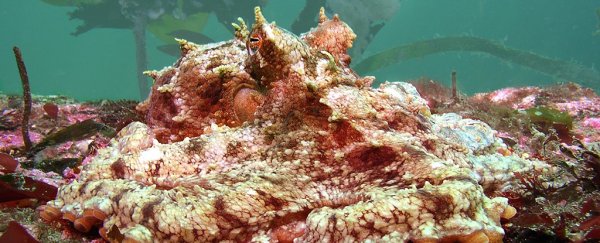We know that all the excess CO2 we're pumping into the air – alongside a host of other damaging effects – is driving up the acidity of the oceans as it sinks and dissolves into the water, but it seems as though the hardy octopus can find ways to adapt to its rapidly changing environment.
Previous research into the impact of ocean acidification on cephalopods such as octopuses, cuttlefish, and squid has shown some indication increased carbon dioxide in the water could negatively impact this type of marine life.
However, in a new study, a group of Octopus rubescens – a species of octopus common to the west coast of North America – were observed adjusting their routine metabolic rate (RMR) over a series of weeks in response to lowering pH levels in the surrounding water.
"Challenges to an organism's physiology are often reflected in changes in energy use and therefore can be observed as changes in aerobic metabolic rate," write the researchers in their paper.
A total of 10 octopuses were studied under controlled lab conditions, with RMR measured immediately after exposure to acidic water, after one week, and after five weeks. Critical oxygen pressure – a measure of whether not not animals are getting enough oxygen – was monitored at the same time.
To begin with, high levels of metabolic change were detected in the creatures – a sort of shock reaction that actually conflicts with earlier research into cephalopods, which had recorded a reduction in metabolic change in similar scenarios.
However, RMR had returned to normal after one week, and remained the same five weeks later, suggesting some adaptation had occurred. The increased acidity did have an impact on the ability of the octopuses to function at low oxygen levels, however.
"This response in RMR suggests that O. rubescens is able to acclimate to elevated CO2 over time," write the researchers. "The observed increase in RMR may be the result of multiple acute responses to hypercapnia [increased CO2 in the blood], possibly including both behavioural and physiological strategies."
Those strategies could include preparing to move to find a new stretch of water to inhabit, for example, the researchers suggest (something that wasn't possible here). The short RMR boost might also reflect the octopuses making quick adjustments to their biological processes to suit the new acid level.
The study is the first to look at both short-term (one week) and longer-term (five week) changes in metabolism rates in cephalopods in response to ocean acidification. We know these creatures are tough, and it seems they even have coping strategies that might allow them to adapt to humans destroying the natural environment all around them.
None of this means that we should be okay with the current climate crisis though, or not be trying to make major changes to reverse it. When we don't take proper care of the planet, it's not just ourselves that we're potentially dooming to extinction.
Also, these tests were done in controlled laboratory conditions that don't take into account many other interlinking factors in the animals' natural environment. For instance, even if the octopus themselves are able to adjust, what about their food supply?
"While this species may be able to acclimate to near-term ocean acidification, compounding environmental effects of acidification and hypoxia may present a physiological challenge for this species," write the researchers.
The research has been published in Physiological and Biochemical Zoology.
